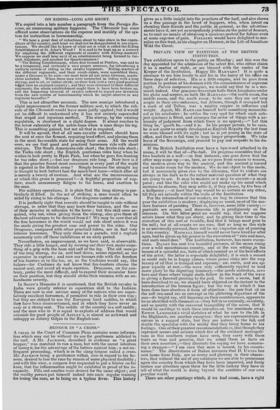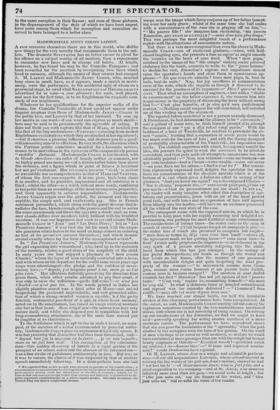PRIVATE VIEW OF PAINTINGS AT THE BRITISH INSTITUTION.
THE exhibition opens to the public on Monday ; and this was the day appointed for the admission of the select few, who either claim it as a -matter of right, or are blessed with the smiles of the Keeper of the Institution. Happy Mr. BARNARD 1 It is quite a pleasure to see him bustle to and fro in the hurry of his office on these days of selection. His is a little empire, and he goes from portion to portion of his domain with the consciousness of supreme right. Parris componere moguls, we would say that he is a mo- narch indeed. Our gracious sovereign hath three kingdoms under his globe and sceptre, so hath Mr. BARNARD-010 north room, the middle room, and the south room : to be sure they are not very ample in their circumference, but Athens, though it occupied but a nook of old Tellus, was a mighty empire in influence and weight. Again, Mr. BARNARD himself hath something monarchi- cal in his attributes : he settles the very spot for which each sub- ject (picture) is fitted, and arranges the order of things with a so- lemnity of judgment from which there is no appeal;—" Let this thing be," quoth he,—and it is. In his proper person, to be sure, he is not quite so amply developed as English Royalty the last time we were blessed with its sight ; but he is yet young in the state of office, and there is full time to hope larger proportiott. We take leave of the Sovereign, and proceed to pay our respedts to his do- minions.
If the British Institution ever have a bye-word attached to its
name, it will be that of—Pie-ball. Its progress resembles that of two buckets in a well :—in that instance, one goes down that the other may come up ;—so, here, as we pass from season to season, the modern gives way to the ancient, and the ancient is turned out to make room for the modern. We do not object to this mode, but it necessarily gives rise to the dilemma, that its visitors are always in the dark as to the rather material question of what they are going to see. It may be modern or it may be ancient—a moot point ; and like the rake who could not make up his mind which mistress to chooSe, they may settle it, if they please, by the toss of a halfpenny ; —at least that way would be as certain as any other, till they are actually within the walls of the Institution. For the information of our readers, we beg to observe that this year the exhibition is modern ; displaying as usual, most of the mo- dern features of painting. There is, however, some little variety ;— portraits are scarce, and domestic life is prodigiously on the increase. On this litter point we would say, that we suppose artists know what they are abotif, and by giving their time to the execution of this sort of twaddle, find that it brings most grist to the mill ; but at all events we are sure, that as long as this style is so universally pursued, there will be no Augustan age of painting in this country. RAPHAEL himself would never have lived for after ages, had he given up his genius to the execution of " rats and mice. and such small deer." The Institution, however, has more excep- tions. DANBY has sent two beautiful pictures, of the moon rising over a wild mountainous country, and of the sun setting in the bosom of a splendid sea, both of which remind us of the best efforts of the artist: the latter is especially delightful; it is such a sunset as could only be in happy climes, where peace sinks into the very luxury of all that is tranquil and reposing: air, earth, and sea ap- pear equally at rest,—the wave only sufficiently rippled to lend more glory to the departing luminary,—the sands unbroken, save here and there where bright shells follow in the track of the wave in giving a farewell greeting to the god. In such a scene, had it been described to us, we should have objected on the instant to the introduction of the human figure ; but the way in which it has been done here absolves it from all objection : the pair that sit on the soft sea-sand are so enwrapt in the glittering departure of the sun—its bright ray, still lingering on their countenances, appears to be so identified with themselves—they fall in so naturally, so calmly, and so quietly with the universal tranquillity of the scene, that it would be sacrilege to wish these intruders on the inanimate away. EDWIN LANDSEER'S vivid sketches of what he saw to the life in the Highlands, are another exception : they are representations of nature in a rugged state, but they are nature to the full, and startle the speci-ator with the reality that they bring home to his feelings. One of their greatest recommendations is, that though they represent scenes and actions which few of the civilized metropoli- tans in this southern region have seen, they carry with them traits so true and genuine, that we admit them as facts on their own assertion ;—they illustrate the saying we have concern- ing a stranger—" I am sure that man is honest, by his counte- nance." The illustrations of Italian manners that D. UWINS has sent home from Italy, are so sunny and glowing in their charac- ters, that without the aid of any catalogue we are able to pronounce upon the country from which they have been imported, and freely bestow our attention upon them for the little history they have to tell of what the world is doing beyond the confines of our own peculiar world. There are other paintings which, if we had room, have a right to the same exception in their favour; and even of those pictures, in the disparagement of the style of which we have been urgent, have some among them which for conception and execution de- served to have belonged to a better class.



















 Previous page
Previous page